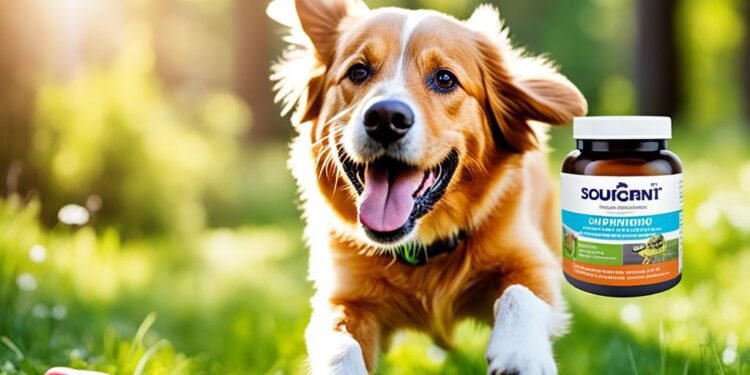Did you know that dogs itching more than five times a day can lead to serious skin problems? These issues include bald patches, pain, and even self-inflicted wounds. Thick, discolored skin can also result from this excessive scratching and licking.
This discomfort is a clear sign that your dog needs help. Luckily, there are many supplements out there that can ease your dog’s itchiness and soothe their irritated skin.
Key Takeaways
- Excessive dog itching can lead to skin problems like bald patches, pain, and rashes.
- Omega-3 supplements can improve a dog’s skin and fur, reducing itching and irritation.
- Combination supplements with postbiotics, fish oil, and egg membrane protein can significantly reduce itching, paw licking, and other allergy symptoms.
- Consulting a veterinarian is recommended for persistent or severe dog skin issues.
- A variety of topical, dietary, and natural remedies are available to provide itch relief for dogs.
Table of Contents
What Causes Itchy Skin in Dogs
If your furry friend is scratching, licking, or nibbling at their skin, they might have skin irritation. Common causes include allergies, parasites, and skin conditions.
Allergies
Allergies are a top reason for itchy skin in dogs. Dogs can be allergic to things like pollen, dust mites, or certain foods. These allergies cause inflammation, leading to red, itchy rashes or hives.
Parasites
Parasites like fleas, ticks, and mites can make dogs very itchy. Flea allergy dermatitis is common. It happens when dogs react to flea saliva, causing intense scratching and irritation.
Skin Conditions
Some dogs have skin conditions that make them itch a lot. Dry, flaky skin, infections, and hormonal imbalances can cause this. These conditions lead to ongoing itchiness.
If your dog is itchy, try some home remedies first. But, it’s best to see your vet. They can find and treat the real cause of the itch. This is important to prevent skin problems from getting worse.
Flea and Tick Control
Dealing with itchy skin in dogs often starts with proper flea and tick control. These pests can cause skin irritation and allergic reactions in dogs. Fleas are especially bad because many dogs are allergic to their saliva. This can lead to severe itching and swelling.
To stop and treat flea and tick infestations in dogs, pet owners have many options:
- Topical preventatives like Advantix II™ and Seresto® collars work well against fleas, especially for dogs with flea allergies.
- Long-lasting oral treatments like Bravecto® chews protect dogs from fleas and ticks for a long time.
- Bravecto® and similar isoxazoline products also treat demodectic and sarcoptic mange, common skin mite problems in dogs.
For flea and tick control for dogs, it’s best to talk to your vet. They can suggest the best prevention and treatment for your dog’s needs. With the right strategy, you can keep your dog happy and free from itching.
Fish Oil Supplements
Fish oil is a great source of omega-3 and omega-6 fatty acids. These are key for a dog’s skin health and overall well-being. Most dog foods have omega-6 fatty acids, but often lack omega-3s like EPA and DHA.
Omega-3 and Omega-6 Fatty Acids
Omega-3s in fish oil boost a dog’s heart health, coat quality, and skin conditions. They also help with allergies, joint pain, immune system, and may fight cancer. Omega-6s in processed dog foods can cause an imbalance. Adding omega-3s from fish oil helps balance their diet.
Benefits for Skin Health
Fish oil supplements are great for dogs with skin issues like allergies or dry, itchy skin. Omega-3 fatty acids in fish oil reduce inflammation and improve skin and coat health. Studies show it lowers itching in dogs with allergies by reducing inflammation.
| Benefit | Explanation |
|---|---|
| Improved Skin and Coat | The omega-3 fatty acids in fish oil can help improve a dog’s coat quality and skin condition, reducing dryness and itchiness. |
| Reduced Inflammation | Fish oil’s anti-inflammatory properties can help alleviate skin conditions and reduce the severity of allergic reactions. |
| Enhanced Immune Function | Omega-3s in fish oil can support a dog’s immune system, helping to prevent and manage skin infections and other health issues. |
When picking a fish oil supplement for your dog, choose high-quality sources like anchovies or sardines. Avoid farmed salmon and other low-quality sources. Also, be careful with high doses as they can cause stomach problems or pancreatitis.
Oatmeal Shampoos and Medicated Shampoos
Oatmeal shampoos and medicated shampoos can really help an itchy dog. Oatmeal has antioxidants and anti-inflammatory properties. It helps improve the skin barrier, moisturize, and even protect against UV rays and fungus.
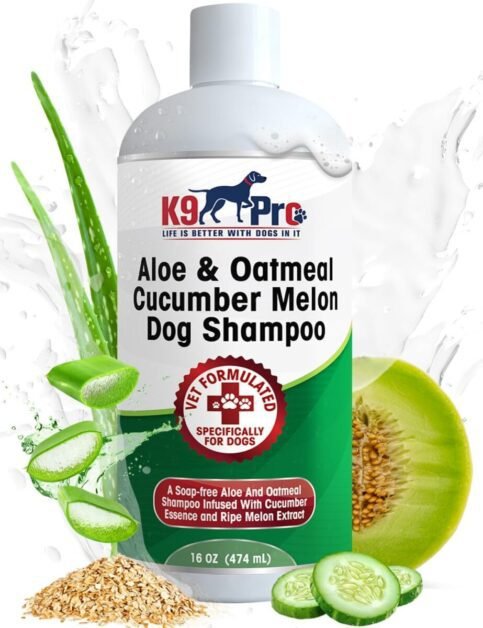
Colloidal oatmeal is made by finely grinding oats and boiling them. This process isolates the useful compounds. It’s a great home remedy for an itchy dog.
For dogs, the best oatmeal products are shampoos made just for them. They are gentler and won’t irritate your pet’s skin like human products might. Sometimes, your vet might suggest a medicated shampoo for more serious skin issues.
- Oatmeal Shampoo is great for dogs with frequent skin irritations.
- Medicated Shampoo is best for dogs with ongoing skin problems like allergies or rashes.
- Itchy Dog Shampoo is safe and works well for adult dogs of any breed or age.
- Liquid shampoos are easier to use, especially for dogs that don’t like to stay still during baths.
While oatmeal and medicated shampoos can help your itchy dog, watch out for any bad reactions. Signs like vomiting or upset stomach could mean your dog ate some shampoo by mistake. These products are made by vets to be safe and effective for your pet.
“Oatmeal Shampoo has been a game-changer for my dog’s itchy skin. It’s gentle, yet effective, and has helped soothe the irritation without any harsh chemicals.”
These shampoos use all-natural ingredients and don’t have artificial additives. They are also cruelty-free, meaning no testing on animals. Plus, they don’t have any harmful chemicals.
Non-Shampoo Topical Solutions
Regular baths are key for dogs with itchy skin, but there are also great topical treatments. These solutions don’t require frequent baths. They target specific areas and keep your pet’s skin healthy.
Mousses and Spot-On Therapies
For dogs who hate baths, a mousse-based product can change everything. These light, easy-to-apply formulas work all over or on itchy spots like the armpits or belly. Vets often suggest Dermoscent® spot-on therapies for dry, flaky skin and to prevent infections.
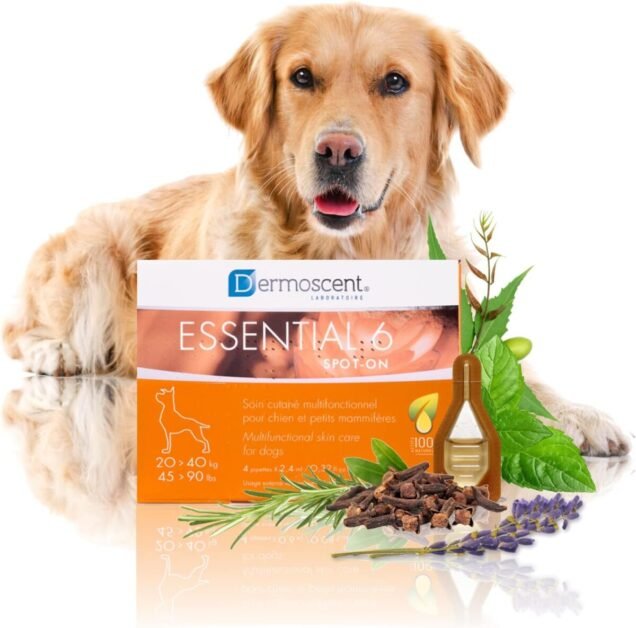
Hot Spot Treatments
If your dog has hot spots, a topical spray like Vetericyn® Plus can help. These sprays soothe inflammation and promote healing. This gives your pup relief from constant itching.
| Product | Price Range | Key Features |
|---|---|---|
| Dermabliss™ Hot Spot Spray – 8oz | $19.99 to $21.99 | Helps soothe itchy hot spots |
| Dermabliss™ Anti-Itch & Allergy Relief Spray | $17.99 to $32.99 (4oz and 8oz sizes) | Relieves itchiness and inflammation |
| Dermabliss™ Anti-Bacterial & Anti-Fungal Chlorhexidine Spray | $16.99 to $18.99 (8oz) | Helps prevent bacterial and fungal infections |
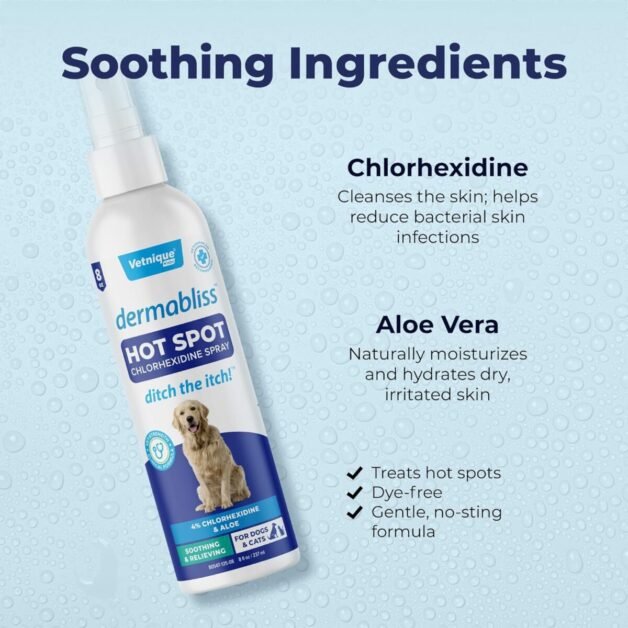
Using these non-shampoo treatments can help your itchy dog feel better. They offer relief and support without the need for frequent baths.
Specialized Diets
Managing itchy skin in dogs often involves special diets. What your pet eats affects their skin health. It’s key to feed them a balanced diet that meets the Association of American Feed Control Officials (AAFCO) standards.
Limited Ingredient Diets
A dog food for itchy skin with fewer ingredients might help. These foods have one main protein and a few other items. This can help find and avoid food allergens. By skipping common allergens like chicken, beef, or pork, you can ease your pet’s skin irritation.
Prescription Diets for Allergies
If food allergies are a problem, your vet might suggest a prescription dog food for allergies. These limited ingredient dog food formulas are made for dogs with allergies. They use new protein sources and select ingredients carefully to avoid allergic reactions.
When trying a new diet, follow your vet’s advice and switch your dog slowly. This helps prevent stomach problems. With the right specialized diet, your dog’s itchy skin can improve, and they’ll get the nutrients they need.
“Skin health is closely linked to nutrition. A well-balanced, high-quality diet can make a significant difference in managing your dog’s itchy skin.”
Natural Remedies for Itchy Dogs
If your dog is itchy, natural remedies can help. There are many options, from supplements to herbal treatments. These can ease your dog’s discomfort and make their skin healthier.
Supplements for Itchy Dogs
Some supplements are great for dogs with itchy skin. Omega-3 fatty acids from fish oil can make their coat healthier and lessen inflammation. MSM, a natural compound, also helps soothe irritated skin.
Herbs and Botanicals
Herbs and botanicals are good for itchy dogs too. Yellow dock root and quercetin are strong antioxidants that help with itching and skin health. Aloe vera gel can be applied directly to reduce redness and discomfort. Baking soda mixed with water can dry out rashes and ease irritation.
Using these natural solutions with your vet’s advice can really help your dog. It can make their skin and coat better. But, if your dog keeps itching a lot, they might need to see a vet to find out why.
| Natural Ingredient | Potential Benefits for Itchy Dogs |
|---|---|
| Omega-3 Fatty Acids | Improved coat health, reduced inflammation |
| MSM | Anti-inflammatory properties, soothing for irritated skin |
| Yellow Dock Root | Antioxidant support, relief for itching |
| Quercetin | Antioxidant properties, promotes healthy skin |
| Aloe Vera Gel | Reduces redness and discomfort in itchy skin |
| Baking Soda | Helps dry out rashes, alleviate itching and inflammation |
Supplements for Itchy Dogs: Relief for Your Pet
Dealing with your dog’s itchy skin can be tough. But, the right supplements can help a lot. The Pet Honesty Allergy Itch Relief Pack is a great choice. It has two supplements that help with skin issues and boost immune health.
This pack includes Allergy Support soft chews and Allergy SkinHealth soft chews. They have ingredients like probiotics, turmeric, salmon oil, flaxseed, and kelp. These supplements are made by experts and vets to help dogs with allergies. They support digestion, immune health, and skin and coat health.
The pack has 90 of each supplement. Dogs need 1-3 chews a day, depending on their size. These supplements aim to lessen scratching, soothe skin problems, and boost the immune system. This helps your pet feel better.
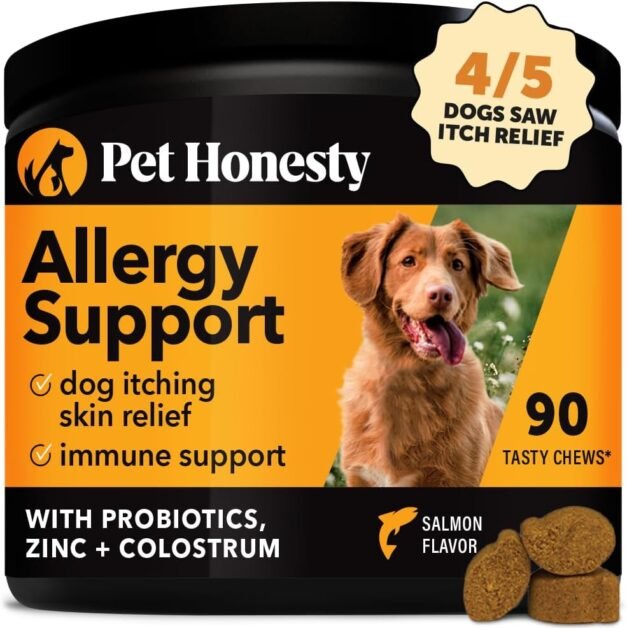
| Supplement | Key Ingredients | Benefits |
|---|---|---|
| Allergy Support Soft Chews | Probiotics, Turmeric, Salmon Oil | Promote healthy skin, reduce scratching, support digestion and immune health |
| Allergy SkinHealth Soft Chews | Vitamin E, Biotin, Kelp, Algae DHA | Improve skin and coat health, reduce shedding |
Studies show that certain ingredients can help with skin allergies in dogs. For example, a 1994 study found EPA-rich marine oils helped with itchiness and skin health. A 2001 study also showed that flaxseed or sunflower oil improved skin and coat quality in dogs.
“Probiotics may reduce allergic reactions in dogs by decreasing intestinal permeability and controlling inflammation,” explains Dr. Teresa Manucy, DVM.
If your dog is always itchy and has skin irritation, the Pet Honesty Allergy Itch Relief Pack might help. It targets the root causes and supports skin and immune health. This can give your pet the relief they need.
Dosage and Administration
When giving supplements to dogs with itchy skin, the right daily amount is key. The amount you give depends on your dog’s weight. For dogs under 25 lbs, give 1/2 tablet twice a day. Dogs between 25-50 lbs should get 1 tablet twice a day.
For dogs from 50-75 lbs, give 1 1/2 tablets twice a day. Dogs over 75 lbs should get 2 tablets twice a day.
Forms of Supplements
These supplements for itchy dogs usually come as tablets. But, there are other choices like chews, powders, or liquids. You can mix these into your dog’s food. Always follow the instructions for the supplement you choose to make sure your dog gets the right amount and benefits the most.
| Dog Weight | Recommended Dosage |
|---|---|
| Under 25 lbs | 1/2 tablet twice daily |
| 25-50 lbs | 1 tablet twice daily |
| 50-75 lbs | 1 1/2 tablets twice daily |
| Over 75 lbs | 2 tablets twice daily |
Knowing the right dog supplement dosage and the different forms of supplements for dogs helps. This way, you can make sure your dog gets the best support for their itchy skin and overall skin health.
Potential Side Effects
It’s key to know the possible side effects of supplements for itchy dogs. Many supplements help with skin issues and allergies. But, always watch your pet closely and talk to your vet before starting new supplements.
Supplements can cause stomach problems, especially with high doses of fish oils or if your pet has a sensitive stomach. This might lead to stomach upset or even pancreatitis. Also, don’t give your pet two supplements that do the same job, even if they’re different. This can cause too much of some nutrients.
Some dogs might react badly to certain ingredients in supplements, like herbs or botanicals. This could cause skin issues, tiredness, or stomach problems. So, start any new supplements slowly and watch how your dog reacts.
| Potential Side Effects | Symptoms |
|---|---|
| Gastrointestinal upset | Vomiting, diarrhea, loss of appetite |
| Pancreatitis | Abdominal pain, vomiting, lethargy |
| Overconsumption of nutrients | Imbalance of essential vitamins and minerals |
| Allergic reactions | Skin irritation, lethargy, digestive issues |
Always talk to your vet before giving your itchy dog any new supplements. This way, you can find the best supplements that help without causing harm. By working with your vet, you can reduce the risks of side effects of supplements for dogs and risks of dog supplements.
Precautions and Considerations
Before adding new supplements to your dog’s diet, talk to your vet first. They can check if the supplement is safe and won’t clash with any medicines your pet takes. They’ll also see if the supplement will really help your dog.
Consulting a Veterinarian
Talking to a veterinarian for dog supplements is key. They can tell you the right amount to give, what side effects to watch for, and how it might affect other medicines. They can also suggest supplements that fit your dog’s specific needs and health.
Monitoring Your Dog
Watch your dog closely when they start a new supplement. Look out for signs of trouble, like eating less, acting tired, or skin issues. Tell your vet right away if you notice anything off.
If your dog is really itchy, your vet might give them medicine to help with inflammation and healing. Make sure to follow their advice and keep an eye on how your dog is doing while they’re taking the medicine.
“Consulting a veterinarian is crucial when it comes to introducing any new supplements or treatments for your dog’s skin health. They can provide personalized guidance and ensure the safety and effectiveness of the supplement regimen.”
Combining Supplements
Using a mix of supplements can be more effective for itchy dogs than one product alone. But, make sure the supplements don’t have the same ingredients. This could lead to too much of a nutrient or redundant effects.
Always talk to your vet before adding new supplements to your pet’s diet. They can check if the supplements are safe, especially if your dog is on other meds. Your vet can also suggest the best supplements for your dog’s needs and help you plan a balanced routine.
- In a 1994 study, dogs taking a high-dose EPA marine-oil supplement got better in six weeks. They showed less itchiness, less self-harm, and better coat health.
- A 2001 study found that giving 18 normal dogs either flaxseed oil or sunflower oil for a month helped their skin and hair.
- Research in 2017 showed that adding more ALA from flaxseeds to dogs with atopic dermatitis improved their symptoms.
When combining supplements for dogs, think about what each supplement does. You might mix omega-3 fish oil with a probiotic for skin and gut health. Or, pair anti-inflammatory quercetin with calming L-theanine for both skin and emotional relief.
By using multiple supplements for dogs thoughtfully, you can tackle your pet’s itchy skin from all angles. Always check with your vet to make sure the supplements are safe and work well together.
| Supplement | Dosage | Benefits |
|---|---|---|
| Omega Fatty Acids | 25 mg/kg EFA + DHA per day | Supports skin health and reduces inflammation |
| Probiotics | Minimum 10 billion CFU per day | Promotes gastrointestinal health and immune function |
| Quercetin | 125 mg for small dogs, 250 mg for medium, 375 mg for large | Reduces allergic inflammation |
| CBD | Varies based on dog’s weight | Reduces allergic inflammation and anxiety |
| L-theanine | Varies based on dog’s weight | Supports anxiety control |
By carefully combining supplements for dogs and following your vet’s advice, you can help your pet with itchy skin. This approach can improve their health and well-being.
Cost of Supplements for Itchy Dogs
The cost of supplements for itchy dogs varies a lot. It depends on the brand, ingredients, and how much you get. For example, the Pet Honesty Allergy Itch Relief Pack costs about $50 for 90 chews in two types.
But, prescription or vet-recommended supplements are usually pricier.
When planning your budget for supplements, think about the long-term costs. This includes vet visits, special shampoos, and other treatments, not just the supplements. The price of dog skin supplements matters, but keeping your dog comfortable should be the main goal.
| Supplement Product | Price Range | Quantity |
|---|---|---|
| Pet Honesty Allergy Itch Relief Pack | $50 | 90-count |
| Dinovite for Small Dogs (75+ lbs.) | $126.95 | 90-day supply |
| Lickochops with Omega 3, 6 & E | Varies | N/A |
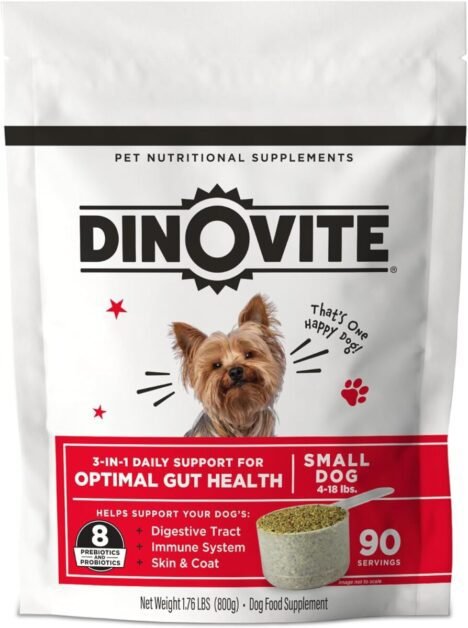
The cost of supplements is just part of the story. You might need vet advice and more to really help your pet. A full plan can make your pet feel better for good.
Top Supplement Products for Itchy Dogs
If your dog is always itchy, there are great supplements that can help. They often have natural stuff like omega fatty acids, probiotics, and antioxidants. These help fix the main reasons why dogs get skin irritation.
The Pet Honesty Allergy Itch Relief Pack is a top choice. It has Allergy Support and Allergy SkinHealth soft chews. These supplements use omega-3s, omega-6s, and plant extracts. They help with skin problems from allergies and boost the immune system.
Another great option for best supplements for itchy dogs is the Vet’s Best Seasonal Allergy Soft Chew Dog Supplements. These chews mix quercetin, bromelain, and essential fatty acids. They lessen inflammation and keep skin healthy.
| Product | Key Ingredients | Dosage | Price |
|---|---|---|---|
| Pet Honesty Allergy Itch Relief Pack | Omega-3s, Omega-6s, Probiotics | 90 Chews | $39.95 |
| Vet’s Best Seasonal Allergy Soft Chew Dog Supplements | Quercetin, Bromelain, Omega Fatty Acids | 90 Chews | $19.99 |
| Native Pet Dog Allergy Relief | Colostrum, Quercetin, Bromelain | 30, 60, or 100 Chews | $29.99 – $49.99 |
For the top rated dog skin supplements, talk to your vet to find the best one for your dog. Using these supplements with things like medicated shampoos and creams can really help your itchy dog.
Conclusion
Many dogs suffer from itchy skin, which can be caused by allergies, parasites, or skin conditions. Luckily, there are supplements that can help. Options include omega-rich fish oils, oatmeal shampoos, and natural anti-itch formulas.
Working with a vet and trying different supplements can help find the right solution. Some supplements, like essential fatty acids, may take 8 weeks to work. A mix of therapies, including supplements, is key for managing skin allergies in dogs.
Good nutrition, grooming, and a clean home are also important. With the right supplements, treatments, and lifestyle changes, you can help your pet feel better. This approach ensures your pet stays happy and healthy.
















